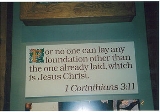
First Epistle to the Corinthians
Overview
The first epistle of Paul the apostle to the Corinthians, often referred to as First Corinthians (and written as 1 Corinthians), is the seventh book of the New Testament
of the Bible. Paul and "Sosthenes
our brother" wrote this epistle to "the church of God which is at Corinth", in Greece.
This epistle contains some of the best-known phrases in the New Testament, including (depending on the translation) "all things to all men" (9:22), "without love, I am nothing" (13:2), "through a glass, darkly" (13:12), and "when I was a child, I spoke as a child, I felt as a child, I thought as a child" (13:11).
There is near consensus among historians and Christian theologians that Paul is the author of the First Epistle to the Corinthians, typically classifying its authorship as "undisputed" (see Authorship of the Pauline Epistles
).
New Testament
The New Testament is the second major division of the Christian biblical canon, the first such division being the much longer Old Testament....
of the Bible. Paul and "Sosthenes
Sosthenes
Sosthenes was the chief ruler of the synagogue at Corinth, who, according to the New Testament, was seized and beaten by the mob in the presence of Gallio, the Roman governor, when he refused to proceed against Paul at the instigation of the Jews...
our brother" wrote this epistle to "the church of God which is at Corinth", in Greece.
This epistle contains some of the best-known phrases in the New Testament, including (depending on the translation) "all things to all men" (9:22), "without love, I am nothing" (13:2), "through a glass, darkly" (13:12), and "when I was a child, I spoke as a child, I felt as a child, I thought as a child" (13:11).
There is near consensus among historians and Christian theologians that Paul is the author of the First Epistle to the Corinthians, typically classifying its authorship as "undisputed" (see Authorship of the Pauline Epistles
Authorship of the Pauline epistles
The Pauline epistles are the fourteen books in the New Testament traditionally attributed to Paul the Apostle, although many dispute the anonymous Epistle to the Hebrews as being a Pauline epistle....
).
Unanswered Questions

